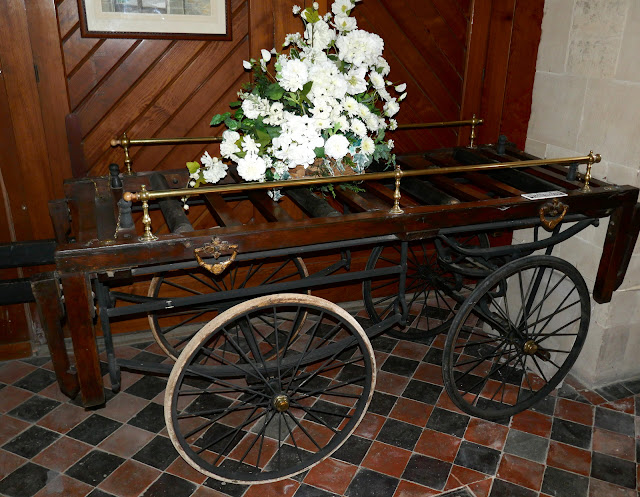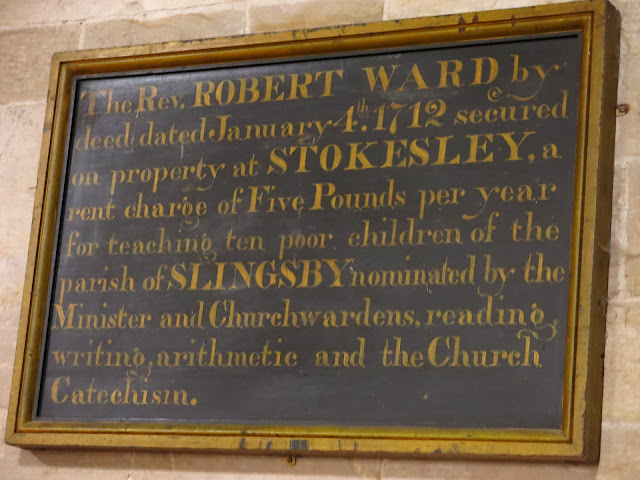Slingsby Castle and Fryton from Hovingham
10.5 miles Windy and warm
Tom Scott Burns says in The Walker's Guide to the Hambleton Hills that this route of woodland paths, open lanes, and the villages of Hovingham and Slingsby, with its ruined castle, will calm the most distraught mind. We would agree except for a confusing forestry trail encountered in the last couple of miles which might make the calm mind distraught once more.
We drove to Hovingham on the B1257 from Helmsley and parked at the roadside next to Hovingham Hall, the front of which was covered in scaffolding.
 |
| Today's walk from The Walker's Guide to the Hambleton Hills |
 |
| Hovingham Hall today |
 |
| How the hall looks normally |
TSB says Hovingham Hall was given to Roger de Mowbray by William the Conqueror and came to the Worsley family in 1563, with the present Hall dating from 1745. Next to the Hall is the Church of All Saints and seeing the door open we decided to look inside before starting our walk.
 |
| All Saints, notes inside say the tower has been untouched since it was built between 1042 and 1066 |
 |
| Church organ |
 |
| Altar window |
 |
| Looking back down the church from the altar |
 |
| Some modern windows |
One of the most striking features of the interior of the church is a 10th century Viking Cross, mounted high in a frame and acting as the church's altar cross. Apparently it was once brightly painted.
 |
| The Viking Cross |
 |
| Design on Viking Cross |
Time was pressing as we had over 10 miles ahead of us so we set off briskly, walking past the scaffolding at the entrance to Hovingham Hall and following the road around to the rear of the hall, where we entered fields at a footpath sign.
We now had a fine view of the rear of the Hall and passed by an attractive bridge and waterfall feature which must have originally been built to be viewed from the Hall.
Shortly after passing the bridge we rejoined the road for a short time before turning left into Mill Wood, the path now following the course of a stream before rejoining the road near to Hovingham Lodge.
 |
| Turn into Mill Wood here |
 |
| Walking through Mill Wood |
 |
| Leaving the wood |
 |
| Pass by Thwaites Cottage |
 |
| ...to reach Hovingham Lodge |
We now crossed fields before rejoining the road and turning in at a sign for 'Aireyholme Farm, Home of the Flitwick Flock'. Sadly the sign has weathered and has become almost illegible.
This farm track also serves Moor House Farm before it reaches Aireyholme and as we walked cheerily along we were suddenly startled by a large white shape in the hedge. At first glance we thought it was a sheep but as it lumbered to its feet we saw it was a large boar which must have escaped from the farm. It pushed its way through the hedge and out of our sight. We walked on and saw a lady farmer at Moor House Farm. We told her what we had seen and she thanked us and told us she had been looking for it and went off to recapture her boar.
 |
| A long walk through fields after the lodge |
 |
| A brief spell on tarmac ... |
 |
| .. before turning in to the farm track |
 |
| ... for a mile's walk to Aireyholme Farm |
 |
| "Wazzat?" |
 |
| ... and the pig got up and slowly walked away. |
We eventually passed by Aireyholme Farm, no sign of the Flitwick Flock today, and reached a fish pond and the pig fields at Howthorpe Farm.
 |
| The fish pond |
 |
| Free Range Pigs |
 |
| True love! |
It was nice to see the pigs outdoors and living proper piggy lives. We stood and watched them for a while before moving on to Fryton Moor where we selected a sheltered spot to sit and enjoy our coffee and scones.
 |
| Looking back at Pig Town from Fryton Moor |
 |
| Time for coffee |
Setting off once again we crossed several more fields before reaching the entrance to Slingsby Bank Wood. A steep climb took us to the ridge and a long gentle descent to Slingsby. We walked through the pretty village to the Methodist church and a brightly coloured Maypole, where TSB reports that Plough Monday sword dancers once cavorted and the Slingsby Temperance Society held a great demonstration in 1851.
 |
| We reach Slingsby Bank Wood... |
 |
| ... and climb to the ridge |
 |
| Entering Slingsby, this was a shop last time we came here |
 |
| Slingsby Maypole and school |
We continued through the village to reach the ruins of Slingsby Castle, which is in a dangerous state and only visible from the neighbouring road. It was built by Sir Ralph Hastings in 1343 and enlarged by his grandson Lord William Hastings, who was beheaded for treason in 1483.
 |
| Weather vane in Slingsby |
 |
| The remains of Slingsby Castle |
Near the castle is The Church of All Saints, which was open so we popped inside. This building is mainly 15th century and the most interesting feature is a Victorian bier, which is in pristine condition.
 |
| Across fields to the hamlet of Fryton |
 |
| HGV weather vane at Fryton |
 |
| Fryton Lane |
 |
| The plaque celebrates the finding of a 4000 year old skeleton in a nearby burial henge |
On reaching the trees we turned right where the path leads through trees for a mile and a half. Towards the end of this stretch the path is easily missed because of recent forestry work and concentration is needed. Eventually we turned north to join the straight path that would take us back to Hovingham.
 |
| A plethora of directions |
 |
| Walking along South Wood |
 |
| Looking back at the trees of South Wood |
 |
| Storm clouds gather... but soon disperse |
 |
| The houses of Hovingham appear in the distance |
 |
| Widows alms houses |
 |
| Entering Hovingham High Street |
Hovingham appeared below us and we walked straight into the village and almost immediately reached the welcoming doors of the Worsley Arms Hotel. Here we sat outside with a pint to discuss today's walk, which is a long one but much recommended.
 |
| Weather vane in Hovingham |
 |
| Walking down the High Street |
 |
| Clive veers into the Worsley Arms |
 |
| "Happy hiking!" |








































































